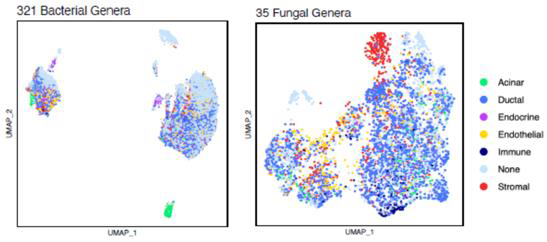

Screening methodology and principle data identifying differences in
microbiome diversity from disease state in pancreatic cancer

Invention Summary:
The microbiome plays an essential role in the prognosis and progression of disease and health, as seen in cancers like pancreatic cancer. Pancreatic cancer is rising in majority of cancer deaths, and remains difficult to study with its large fibrotic tumor volume that hinders sampling and cellular mechanistic studies by existing bulk profiling methods. With increasing interest in using the microbiome for treatment of disease, current methods remain non-specific in identifying tumor-microbiome interactions. There are currently no resources to thoroughly identify microbial associations at a more specific single cell resolution for prediction of disease and survival in tumor microenvironments.
Rutgers researchers have developed and utilized a systematic approach in quantifying and separating the microbiome using single-cell sequencing data and analyzing tumor-microbiome interactions at a single cell resolution. The novel analytical framework, SAHMI (Single-cell Analysis of Host-Microbiome Interactions), was developed to identify differences between human pancreatic ductal adenocarcinomas and control tissue. This method identifies microbial diversity in disease versus control, microbiome-tumor co-evolution, association of cell-type specific pathways with tumor microenvironment, patient-specific tumor phenotype, and can predict patient survival. Through pinpointing specific patterns in the microbiome associated with cell signaling and disease in high resolution, this invention can identify these patterns for diagnosis of disease and target for treatment.
Advantages:
• Single-cell resolution using single-cell RNA sequencing technologies
• Unbiased analysis of microbe-to-cellular pathway interactions with the whole microbiome
• Higher resolution than current technologies, targeting 1/10 the size of eukaryotic cells
Market Applications:
• Microbiome-based diagnostic tests for cancer and other diseases
• Biomarker and drug discovery screening method using the microbiome
Intellectual Property & Development Status: Patent pending. Available for licensing and/or research collaboration.